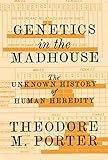Genetics in the madhouse : the unknown history of human heredity / Theodore M. Porter.
By: Porter, Theodore M [author.] .
.
Material type:  BookPublisher: Princeton, NJ : Princeton University Press, 2018Publisher: Princeton, New Jersey : Princeton University Press, [2018]Copyright date: �2018Description: 1 online resource (xii, 447 pages) : illustrations.Content type: text Media type: computer Carrier type: online resourceISBN: 9781400890507; 1400890500.Other title: Unknown history of human heredity.Subject(s): Eugenics
BookPublisher: Princeton, NJ : Princeton University Press, 2018Publisher: Princeton, New Jersey : Princeton University Press, [2018]Copyright date: �2018Description: 1 online resource (xii, 447 pages) : illustrations.Content type: text Media type: computer Carrier type: online resourceISBN: 9781400890507; 1400890500.Other title: Unknown history of human heredity.Subject(s): EugenicsIntroduction: Data-heredity-madness: a medical-social dream. Part I: Recording heredity. Bold claims to cure a raving king let loose a cry for data, 1789-1816 -- Narratives of mad despair accumulate as information, 1818-1845 -- New tools of tabulation point to heredity as the real cause, 1840-1855 -- The census of insanity tests its status as a disease of civilization, 1807-1851 -- Part II: Tabular reason. French alienists call heredity too deep for statistics while German ones build a database, 1844-1866 -- Dahl surveys family madness in Norway, and Darwin scrutinizes his own family through the lens of Asylum data, 1859-1875 -- A standardizing project out of France yields to German systems of census cards, 1855-1874 -- German doctors organize data to turn the tables on degeneration, 1857-1879 -- Alienists work to systematize haphazard causal data, 1854-1907 -- Part III: A data science of human heredity. The human science of heredity takes on a British crisis of feeblemindedness, 1884-1910 -- Genetic ratios and medical numbers give rise to big data ambitions in America, 1902-1920 -- German doctors link genetics to rigorous disease categories then settle for statistics, 1895-1920 -- Psychiatric geneticists create colossal databases, some with horrifying purposes, 1920-1939 -- Aftermath: Data science, human genetics, and history.
Includes bibliographical references and index.
Online resource; title from PDF title page (EBSCO, viewed April 16, 2018).
In the early 1800s, a century before there was any concept of the gene, physicians in insane asylums began to record causes of madness in their admission books. Almost from the beginning, they pointed to heredity as the most important of these causes. As doctors and state officials steadily lost faith in the capacity of asylum care to stem the terrible increase of insanity, they began emphasizing the need to curb the reproduction of the insane. They became obsessed with identifying weak or tainted families and anticipating the outcomes of their marriages. Genetics in the Madhouse is the untold story of how the collection and sorting of hereditary data in mental hospitals, schools for "feebleminded" children, and prisons gave rise to a new science of human heredity. In this compelling book, Theodore Porter draws on untapped archival evidence from across Europe and North America to bring to light the hidden history behind modern genetics. He looks at the institutional use of pedigree charts, censuses of mental illness, medical-social surveys, and other data techniques--innovative quantitative practices that were worked out in the madhouse long before the manipulation of DNA became possible in the lab. Porter argues that asylum doctors developed many of the ideologies and methods of what would come to be known as eugenics, and deepens our appreciation of the moral issues at stake in data work conducted on the border of subjectivity and science. A bold rethinking of asylum work, Genetics in the Madhouse shows how heredity was a human science as well as a medical and biological one
IEEE IEEE Xplore Princeton University Press eBooks Library


There are no comments for this item.